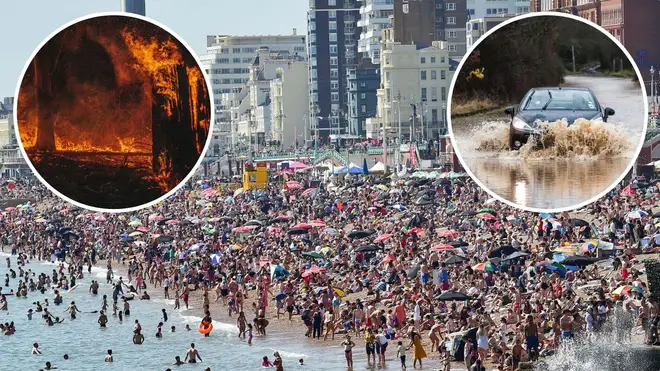
Nick Abbot 10pm - 1am
3 November 2021, 01:34

'Lucifer' heatwaves over summer were 'impossible' without human-induced climate change, experts have warned.
Extreme weather took its toll on several countries around the world throughout the summer months, from flash flooding to scorching heatwaves.
Forecasters recorded temperatures close to 1C above the 1991 to 2020 average across Europe, with a new European maximum temperature record set in Sicily.
Temperatures peaked at 48.8C in what was dubbed the 'Lucifer' heatwave due to its extremity.
Though it was not confirmed to be connected, climate researcher Professor Peter Stott said "we can be more confident than we've ever been" about links between the two.
He added: "The increasing chances of these extreme events continue to rise as long as we continue to emit greenhouse gases.
"The science is clear that the faster we reduce our emissions of greenhouse gases, the more we can avoid the most severe impacts of climate change."
Read more: 'We've pulled two goals back in the fight against climate change': PM hails Cop26 talks
Read more: 'Extinction' in 10 years for Pacific islands, Samoan climate activist warns

UN report sets out stark reality of climate crisis
Scientists analysed data using computer simulations, comparing Earth's 1C increase with the climate as it would have been without human influence.
They concluded that the spike in temperatures would have been "impossible" without human-induced climate change.
Met Office climate attribution scientist, Dr Nikos Christidis, who led the analysis, said: "This latest attribution study is another example of how climate change is already making our weather extremes more severe.
"Our analysis of the European summer of 2021 shows that what is now a one in three-year event would have been almost impossible without human-induced climate change."
Read more: PM lists three cities that could be lost if no climate action is taken

Flash floods across London cause travel chaos
Along with extreme heat, flooding also hit several European countries in July, including the UK.
At the time, Mayor of London Sadiq Khan warned that the flooding showed "the dangers of climate change are now moving closer to home".
Germany and Belgium were among other countries hit by flooding during the same period, with at least 153 people dying from the severe conditions, with another 1,000 unaccounted for following the disaster.
German chancellor Angela Merkel described the flooding as "a catastrophe".

Rising water fills area as Germany endures major flooding
It comes as world leaders have gathered in Glasgow for the COP26 climate summit, in an effort to tackle the ongoing crisis.
Ahead of the event, Prime Minister Boris Johnson labelled it as "a turning point for humanity", with concerns continuing to grow over the impact of global warming.
On Tuesday, leaders announced pledges to halt deforestation and cut methane emissions, in what US president Joe Biden labelled as "historic progress".
As part of the previous Paris Agreement, targets were set to stay within 1.5C of pre-industrial temperature levels, with the long-term goal of reaching net zero by 2050.